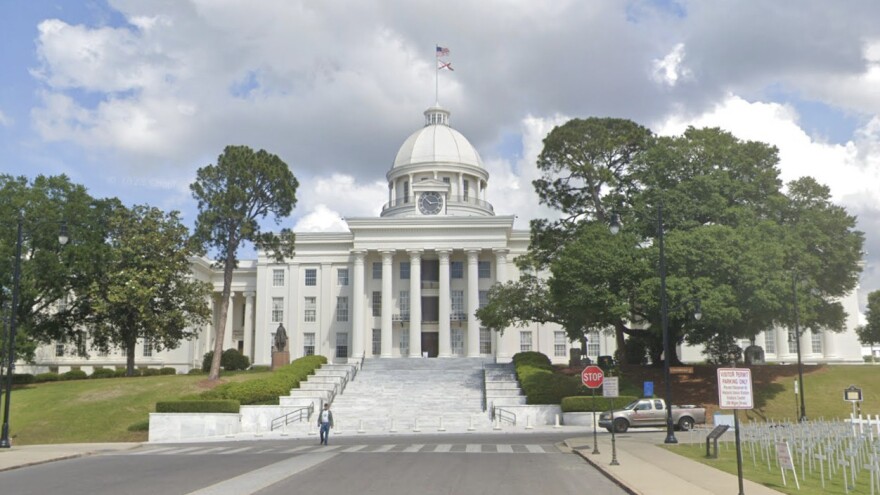Updated March 20, 2024 at 2:35 PM ET
Alabama Gov. Kay Ivey signed a bill Wednesday that bans state funding of diversity, equity and inclusion programs in schools, public colleges and state agencies, joining a wave of Republican-led efforts to quash DEI initiatives.
The new law will impose restrictions around what it calls eight "divisive concepts" dealing with race and personal identity. It also requires public colleges to designate bathrooms "for use by individuals based on their biological sex."
Ivey signed the bill one day after the state House and Senate gave final approval to the measure, SB 129. It will take effect on Oct. 1. College students who oppose the bill have organized protests against it, including a large rally at the State House earlier this month, member station WBHM reports.
"The purpose of this bill is to prevent compelled speech and indoctrination," Republican Sen. Will Barfoot said when he introduced the legislation, according to WBHM.
Since 2023, 80 anti-DEI bills have been introduced in 28 states and Congress, according to The Chronicle of Higher Education. Measures have been signed into law in eight states.
Critics of such bills say they're motivated more by politics than by educational aspirations; they also say efforts to ban DEI are more likely to undermine, rather than protect, free speech protections.
What does the Alabama bill specifically ban?
Under the bill, anyone who knowingly violates its restrictions can be disciplined or fired. The nine-page bill lists eight main prohibitions, aimed at public colleges, local boards of education, and state agencies.
It says they cannot:
- Sponsor or maintain a DEI program or office;
- "Direct or compel a student, employee, or contractor to personally affirm, adopt, or adhere to a divisive concept";
- Require people to "attend or participate in any diversity, equity, and inclusion program or any training, orientation, or course work that advocates for or requires assent to a divisive concept";
- Make anyone "share his or her personal point of view on any divisive concept outside of an academic setting";
- Require students, workers, or contractors to take part "in an activity that involves lobbying at the state or local level for legislation related to a divisive concept";
- "Penalize or discriminate against a student, employee, or contractor" because they've refused to endorse, "confess, or otherwise assent to a divisive concept or diversity statement";
- Use race or color as the sole condition for enrolling in a class, training, or orientation;
- Spend their own funds "or apply for or accept a grant, federal funding, or private funding, for the purpose of compelling assent to any divisive concept or any other purpose prohibited in this act, provided that such funding may be provided to student, faculty, or staff organizations or associations."
What are the "divisive concepts"?
The legislation does not specifically mention the troubling record of Alabama and the U.S. on race, such as the dehumanizing enslavement of Black people and longstanding attempts to disenfranchise Black voters. The way schools teach students about those topics has been a political lightning rod in recent years, as opponents took aim at critical race theory.
The new Alabama legislation lists eight "divisive concepts" that range from the idea that "any race, color, religion, sex, ethnicity, or national origin is inherently superior or inferior" to the notion that "any individual should accept, acknowledge, affirm, or assent to a sense of guilt, complicity, or a need to apologize on the basis of his or her race, color, religion, sex, ethnicity, or national origin."
The bill also rejects the idea that any "individual is inherently racist, sexist, or oppressive, whether consciously or subconsciously" — a position that runs counter to what social scientists have concluded in recent decades.
Other divisive concepts, the legislation states, include the idea that people in one demographic group "are inherently responsible for actions committed in the past by other members" of that group.
What does the bill NOT do?
The bill's longest section is devoted to laying out its limits — and some of the language seems geared toward preventing it from being overturned by legal challenges.
"Nothing in this act," the legislation states, ".... May be construed to inhibit or violate the First Amendment rights of any student or employee, or to undermine the duty of a public institution of higher education to protect, to the greatest degree, academic freedom, intellectual diversity, and free expression."
But that is exactly what was construed by Alabama House Rep. Ontario Tillman, a Democrat, during debate over the bill.
"This is a Fourteenth Amendment violation. Clearly vague. Clearly unconstitutional," he said, according to WBHM. "We're putting a prior restraint on my thoughts of speech," he added, calling out what he said was a First Amendment violation.
The bill says it doesn't prevent students, staff, or faculty groups from hosting DEI event or discussions, as long as they don't use state money.
Other provisions deal with situations that might arise in the classroom. The bill says it would not prevent a teacher or contractor from "responding to questions that are raised by participants" relating to DEI or "divisive concepts."
In other subsections, the bill gives some leeway to colleges needing to fulfill accreditation standards or requirements, both in their subject matter and in the collection of demographic information.
Interpreting the legislation could vary, according to different circumstances. While the bill targets DEI efforts, it also states that public colleges can authorize teaching any divisive concept, as long as it's done "in an objective manner and without endorsement as part of a larger course of academic instruction" that does not "compel assent" and otherwise adheres to the bill.
While it does apply to contractors used by the state or its schools, the bill specifically excludes any person or company that does construction work.
Copyright 2024 NPR. To see more, visit https://www.npr.org.



